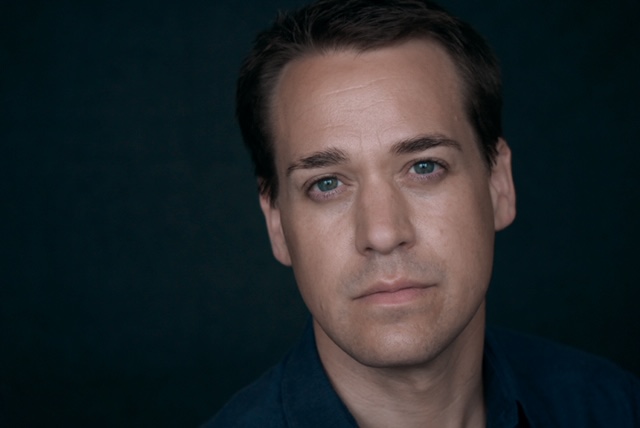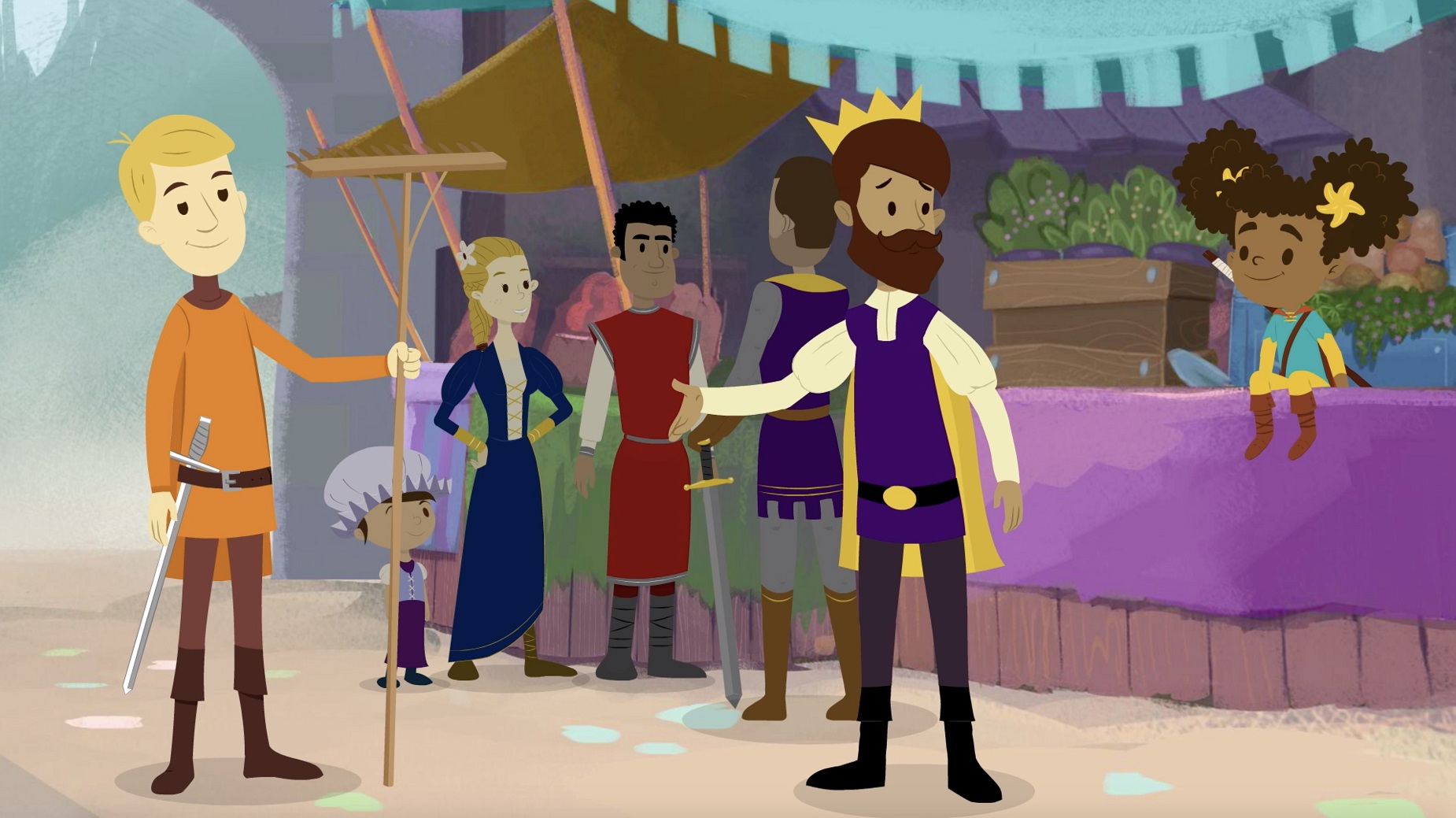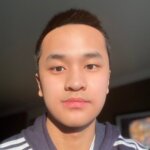Two years after earning his first Primetime Emmy nomination for his portrayal of the affable and beloved Dr. George O’Malley on Grey’s Anatomy, T.R. Knight made an announcement in 2009 that stunned fans of the hit ABC medical drama: he was leaving the show after five seasons, citing a “breakdown of communication” between him and series creator Shonda Rhimes and a “need to be fulfilled in my work.”
For much of the last decade, Knight, who was born and raised in Minneapolis and began his career in musical theatre, has regularly sought out roles across different mediums that have propelled him to new creative heights. By lending his voice to the lead character of The Bravest Knight, which debuted two years ago on Hulu and is now streaming on CBC Gem, the 48-year-old actor is ushering in a new era of LGBTQ2S+ representation in children’s animation.
Created by Daniel Errico and produced by the Vancouver-based Big Bad Boo Studios, the animated series follows Sir Cedric (Knight)—who is married to the prince of his dreams (voiced by Wilson Cruz)—as he recounts his journey from pumpkin farmer to full-fledged knight. (Sir Cedric’s adopted daughter, Nia (Storm Reid), is also training to become a knight.) The series is ranked among the first children’s programs to feature an openly gay lead character and a household with gay parents.
“I didn’t have anything like this growing up. Maybe I could have imagined it, but not really because I never saw myself [onscreen],” Knight tells Xtra in a recent Zoom interview from his home in Los Angeles. “I think when you’re a kid, when you’re a teenager, you’re consuming all of these images and television shows, and the rare times you do see yourself, there’s not a lot of love and not a lot of happiness there.”
Knight spoke with Xtra about the importance of LGBTQ2S+ representation for viewers of all ages, the issues that continue to affect the community both inside and outside of the entertainment industry, his own decision to come out publicly nearly 15 years ago and the transformative experience of starring in Grey’s Anatomy (and returning last season in a dream sequence).

What would you like younger viewers—particularly those who might feel unseen or underrepresented in the media that they consume—to take away from your portrayal of Sir Cedric and from this show in general?
I don’t know about my portrayal of Sir Cedric. With all due respect, I feel a little uncomfortable with that, because I’m just one of many wonderful characters. But I’d love for it to be something that they want to watch, something that sparks imagination.
It’s more about just seeing yourself. You can see the damage that’s done when you don’t know where you fit in or don’t know how you fit in or don’t feel like you fit in. It’s such a falsehood, it’s such a lie, because there is a place. It’s just a matter of who controls what’s being seen, right? There’s a part of me that is, as grateful as I am, a little frustrated that it’s 2021, and this is one of the first shows [to feature a queer family on children’s television]. I just want to leap forward sometimes a bit.
But what I love about the show is through these lessons that Sir Cedric teaches his daughter, Nia, who wants to be a knight, a lot of it revolves around kindness, generosity and love. And I think if some of that can be incorporated into all our lives, I think so much the better.
What do you have to say to the people who continue to insist that having LGBTQ2S+ people or queer-centric storylines is pushing an “agenda” on younger viewers?
Well, I don’t know if they’d listen. I don’t know if I have anything to say. But don’t they have an agenda? Just using that word—: if they have an “agenda,” why is there room for only one? Coming at it from my world, I see that, without our voices being heard, they are using fear and intimidation to further their falsehoods—to keep them alive, present and crackling. And I think that it’s worse than damaging sometimes. I don’t even know if I have the words to explain how I’m feeling right now, but I think that we know they’re trying to keep our voices silent, wanting to keep us invisible, wanting to keep us down. That causes people to kill themselves. It kind of is as simple as that. It’s not just the pain that they cause in life. Is that their agenda? Because if that’s their agenda, I can’t speak to that at all. That’s too horrific to contemplate.
Have you noticed a shift in attitudes across different forms of entertainment or demographics, or do you still feel like we are experiencing many of the same issues that have plagued the community for decades?
Both, I think. For a younger generation—maybe your generation and younger—I think we’re seeing it. It’s really being reflected, but also the other thing is still going on plenty as well. Especially in film and television, there’s still way too much stereotype. It’s been too many decades of seeing the wrong version of us, if that makes sense. People are still learning.
“You’re just like, ‘Oh my gosh, that question wouldn’t be asked if they were playing a murderer.’”
There’s a conversation I heard recently of someone being concerned about if they’re playing someone who is queer and living their truth as a queer person, and wanting to make sure that the actor playing it was comfortable with that. This was just an overheard conversation that friends have, and you’re just like, “Oh my gosh, that question wouldn’t be asked if they were playing a murderer.” You know what I mean? We have far to go. It’s nice to see that reflected in television and film, that younger generations seem to be teaching us something, and I hope that continues. It will continue.
You’ve been able to do so much varied work over the years across film, theatre and television. But the role that will likely define your career is Dr. George O’Malley on Grey’s Anatomy. Looking back, how did that role change your life?
As an actor, it was such a change for me—but not as much as people might think. I had my small life living in Los Angeles filming the show. It was very much going to work every day, putting in the hours and doing your best job to bring this character to life. So much of those years were spent putting my head down and doing the work. As an actor, coming from the theatre and growing up as a theatre nerd, it was one of those rare occasions where you got to learn a completely different side of acting. The core tenets are obviously the same, but on-the-job training of learning how to do it for different optics, for the camera versus the audience in a theatre was a big change for me.
Chandra Wilson [who has played Dr. Miranda Bailey since 2005] and I had—I don’t know if you would call it a pact—but this mindset of: “We’re going to live in denial.” [Laughs.] Any time you do something, of course you want people to see it. We just chose to ride the denial train, and all of that kind of stuff just didn’t exist. It was just too much to take in. She’s from New York and from the theatre as well, so we adopted that, and I think that served us well.
In October 2006, during the third season of Grey’s, you decided to come out publicly, because you wanted to “quiet any unnecessary rumours that may be out there.” When did you decide to come out to those closest to you?
You go through stages, right? Maybe it’s not universal, but it starts like everybody does. You start by making that huge leap for yourself where you realize that you’ve been running from something for a long time, and it’s time to push through the fear.
I remember telling my first friend: I was in my early 20s, and I remember shaking. I was in a shitty little apartment. I just remember telling that first person. Then, you would tell someone else and be like, “Don’t tell anybody.” I was in Minnesota at the time, and it was that carefully guarded mindset of “only you can know.” But slowly, that gets bigger and bigger and bigger as you get more and more comfortable with yourself.
Then, going from personal to public, that becomes a whole other kettle of fish. And I don’t know how to put that into words, what that means telling strangers. I felt there was no other choice for me but to come out publicly. I’d lived the life of skirting it in interviews and not talking about it, and that constant negotiation of: “Who do I tell, and how do I tell them? What do I tell them? And what will it do? And how will that affect things?” All of that crazy fear that is so oppressive, that just weighs you down and weighed me down so much.
“I was newly dating an actor at that time who wasn’t out, and that was kind of an impossible situation.”
I had a conversation with an actor who was in the closet, and at that point, he had been in the public for a long time and just talked about how he had to “navigate.” I just remember that being a huge moment for me. I thought, “I don’t want to live like that.” I was newly dating an actor at that time who wasn’t out, and that was kind of an impossible situation—having someone just freshly come out and having the other not come out. That was really hard, but I think it got to a point for me where I felt like there was no other choice. That’s not a life I wanted to continue living.
Your exit on Grey’s was the culmination of many hurtful things that happened behind the scenes. But what was it like to return in last season’s surreal dream sequence, with Ellen Pompeo, Chandra and James Pickens Jr. by your side on that breathtaking day by the beach?
Surreal is a great way to put it. To be able to say [showrunner] Krista [Vernoff]’s words and to slip back into George for a day was completely surreal, and it was joyful. There was not just Ellen, Chandra and Jim. You turn the cameras around, and you have all of the people who run the show, and so many of them are still there.
One of the old makeup people—our head makeup guy, Norm Leavitt, he’s kind of in semi-retirement now—called me up and was like, “I can come back to the beach if you want.” That was amazing. I was like, “I think I’m just gonna put on sunscreen, but sure. Please come!” Linda Klein, who is the medical backbone of the show, who makes sure that things are accurate, she wasn’t even needed because we’re at the beach and there’s no brains for us to be cutting into or anything, but she came for the day.
It was completely unexpected, and to have it happen in that new world of Meredith’s imagination was also just so sweet. I know that sounds like a corny way to describe it, but it filled me up in a way I didn’t expect.
Did it give you any closure?
Yeah, I think it did in a completely unexpected way. It had been 10 years, so there was a closure that already happened, but it was an added, extra closure. I’ve described it as a bow tie onto that experience, and something I was really grateful for.
With the power of social media, you’ve developed quite a following after Grey’s, and been outspoken about the current sociopolitical climate in the United States. What do you think are the most pressing issues that directly impact the LGBTQ2S+ community in the current political landscape?
The division, the fear of the “other,” the fear of the unknown—I think it’s concerning how dangerous it is. I’m happy anytime we can move in the opposite direction of that, and unfortunately, recently, there seems to be too large of a faction who wallow and relish that fear.
I don’t know if I can answer your question specifically. It’s so big what’s happening in our country right now, and I know that it’s not just our country, but I can only speak from my experience here that it is a poison. On my darker days, I’m wondering how insidious, how much this poison has spread. What’s the lasting damage of that? But on my lighter days, I have hope that if enough of us continue to radiate love and kindness—as dorky as that may sound—I think it is an antidote. And on my better days, that helps me. I’m sorry I can’t answer specifically, because it feels too overwhelming when you ask me this question to go too micro, because it seems macro to me at this moment.
In that case, how would you like to continue using your voice and your platform to effect some sort of change?
I think, in my small kind of life as a dumb, little actor, I hope for more queer writing and queer writers. I hope for authentic queer characters, ones that aren’t still used as stereotypes. I’d like to continue to be a part of that. I think that still too often, me and a lot of my friends still don’t see ourselves and our lives [in mainstream entertainment].
Being queer is a part of us. It is a part of who we are. It is central to who we are, but it is one part, and our daily lives revolve around so much more. I think it will take more queer writers—and I’m not saying only queer writers can do it, but they also need a place at the table. The table needs to be bigger; we need more seats. We’re getting a little better at it, year by year. We need to pull up all the chairs. And as someone who says other people’s words for a living, that excites me—that opportunity to play those kind of roles, to show those lives.
This interview has been edited and condensed for clarity.
The Bravest Knight is available to stream on Hulu in the U.S. and on CBC and CBC Gem in Canada.


 Why you can trust Xtra
Why you can trust Xtra


